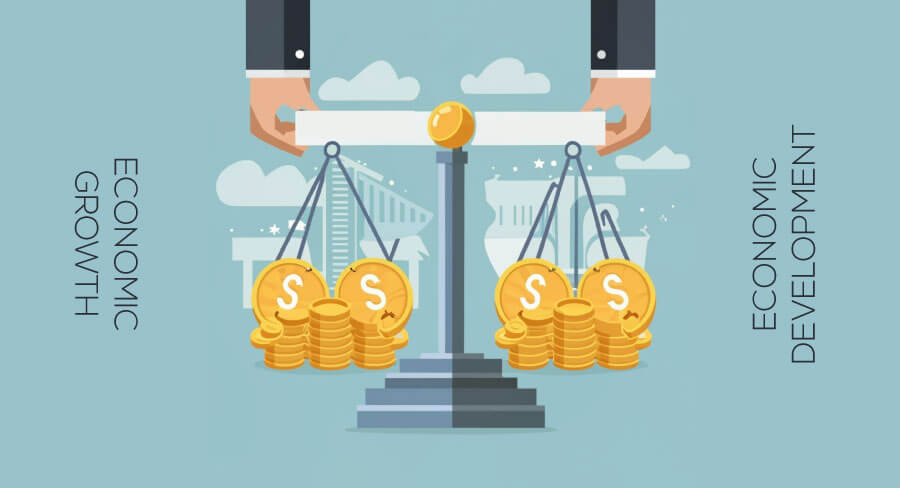Difference between Economic Growth and Economic Development
Exploring the difference between economic growth and economic development reveals a crucial distinction beyond numbers. Economic growth, focused on quantitative expansion measured by indicators like GDP, represents the increase in a nation’s economic activities.
Economic Growth
Economic growth is the continuous rise in a nation’s production and consumption, commonly measured by Gross Domestic Product (GDP). It emphasizes increased output, income, and employment. However, it mainly focuses on quantitative aspects and may not capture broader dimensions like social well-being, income distribution, and environmental sustainability.
Key Elements of Economic Growth:
- Gross Domestic Product (GDP): Represents a nation’s economic output, measured quantitatively.
- Investment: Enhances productivity and efficiency through increased investments in capital, infrastructure, and technology.
- Technological Progress: Drives growth by improving productivity, and efficiency, and fostering innovation.
- Labor Force Participation: A growing labor force contributes to increased productivity and output.
- Education and Human Capital: Investments in education and skill development create a more capable and productive workforce.
- Trade and Globalization: Stimulates growth by expanding business opportunities and fostering competition through global trade.
- Infrastructure Development: Promotes economic growth by improving efficiency through infrastructure upgrades.
- Government Policies: Entrepreneurship-friendly policies, innovation support, and a business-friendly environment encourage economic growth.
- Stable Macroeconomic Environment: Low inflation, manageable debt levels, and sound fiscal and monetary policies support sustained growth.
- Natural Resources: Effective utilization of natural resources contributes to growth, especially in resource-rich countries.
Economic growth, while crucial, doesn’t guarantee improvements in overall well-being, income distribution, or environmental sustainability—considerations falling within the domain of economic development.
Read More: Differences Between Private and Public Administration
Economic Development
Economic development is a multidimensional concept that goes beyond the quantitative aspects of economic growth. It encompasses a holistic and qualitative approach to improving the well-being of society. Economic development considers not only the expansion of the economy but also the enhancement of various aspects, including social, political, and cultural factors. Unlike economic growth, which predominantly focuses on increasing the production and consumption of goods and services, economic development takes into account the broader context of human progress.
Key elements of economic development include:
- Human Development Index (HDI): A composite measure that considers factors such as life expectancy, education, and income to assess the overall well-being of a population.
- Social Infrastructure: Emphasis on building and strengthening institutions related to education, healthcare, and other social services to improve human capital.
- Poverty Alleviation: Strategies and policies aimed at reducing and ultimately eradicating poverty, ensuring that the benefits of development are inclusive.
- Environmental Sustainability: Balancing economic progress with the preservation of the environment, recognizing the importance of sustainable practices for long-term well-being.
Economic development seeks to create a comprehensive and inclusive improvement in the quality of life for individuals within a society, considering both material and non-material aspects of well-being.

Difference between Economic Growth and Economic Development
Economic growth and economic development, while interconnected, rest on distinct philosophical foundations. Economic growth is rooted in the philosophy of quantitative expansion, emphasizing the increase in a nation’s production capacity. In contrast, economic development adopts a more holistic philosophy, recognizing that progress transcends numerical indicators and extends into the realms of social, political, and institutional well-being.
1. Philosophical Foundation
Economic growth and economic development, while interconnected, rest on distinct philosophical foundations. Economic growth is rooted in the philosophy of quantitative expansion, emphasizing the increase in a nation’s production capacity. In contrast, economic development adopts a more holistic philosophy, recognizing that progress transcends numerical indicators and extends into the realms of social, political, and institutional well-being.
2. Metric Emphasis
Economic growth places a paramount emphasis on quantitative metrics, often measured through the percentage increase in Gross Domestic Product (GDP). This approach prioritizes the sheer output of goods and services, showcasing the expansion of economic activities. Economic development, on the other hand, takes a qualitative approach, considering a diverse set of metrics such as GDP per capita, literacy rates, life expectancy, and human development indices. This broader spectrum of indicators captures the nuanced dimensions of progress.
3. Temporal Dynamic
The temporal dynamics of economic growth and economic development reveal distinctive patterns. Economic growth tends to exhibit short to medium-term manifestations, influenced by fluctuations in the business cycle. In contrast, economic development requires a sustained, long-term commitment. It recognizes that meaningful progress necessitates comprehensive, enduring efforts to address multifaceted challenges and achieve lasting improvements.
4. Equity in Wealth Distribution
A crucial difference lies in how these concepts address wealth distribution. Economic growth might not inherently address issues of income inequality, potentially leading to disproportionate wealth distribution among different segments of society. Economic development, however, is inherently tied to the notion of inclusive growth. It strives for a more equitable distribution of economic benefits, aiming to uplift all members of society and reduce socio-economic disparities.
5. Human-Centric Focus
While economic growth primarily centers on the expansion of economic activities, it may not inherently prioritize the well-being of individuals. In contrast, economic development places a central focus on improving the quality of life, health, education, and overall standards of living for the population. It recognizes that true progress must translate into tangible improvements in the daily lives of people.
6. Multi-faceted Determinant
The drivers of progress differ significantly between economic growth and economic development. Economic growth is often propelled by increased investment, technological advancements, and heightened productivity. In contrast, economic development considers a comprehensive array of determinants. It includes education, healthcare, infrastructure, governance, and social justice as integral components in the development process.
7. Environmental Sustainability
A critical distinction emerges in their stance on environmental sustainability. Economic growth might occasionally come at the expense of ecological balance, contributing to resource depletion. In contrast, economic development embraces the imperative of sustainable practices. It seeks to harmonize economic progress with environmental well-being, recognizing the interconnectedness of ecological health and societal prosperity.
8. Institutional Strengthening
Institutional quality and governance play a pivotal role in determining the success of economic development efforts. While economic growth may not inherently lead to improvements in governance structures or institutional quality, economic development acknowledges the crucial role of strong institutions. Effective governance is seen as foundational to fostering comprehensive progress in societies.
9. Global Context
The global context within which these concepts operate also underscores their differences. Economic growth can be pursued independently by nations, potentially without addressing global economic imbalances. Economic development, however, is often viewed within a global framework. It emphasizes the importance of reducing disparities between developed and developing nations, recognizing the interconnectedness of global progress.
10. Education as Empowerment
Education is a key differentiator in their approach to workforce empowerment. Economic growth may generate increased demand for skilled labor but might not systematically address disparities in educational access. Economic development, in contrast, prioritizes investments in education and skill development. It sees these investments as pivotal tools for empowering the workforce, reducing socio-economic gaps, and fostering long-term sustainable progress.
11. Healthcare Emphasis
The emphasis on healthcare as a component of progress also distinguishes economic growth from economic development. Economic growth may not inherently lead to improvements in healthcare access or overall public health. Economic development, however, targets the enhancement of healthcare infrastructure and services. It aims to elevate the overall well-being of the population by ensuring access to quality healthcare.
12. Holistic Poverty Alleviation
While economic growth alone may not be adequate for eradicating poverty or significantly reducing poverty rates, economic development encompasses poverty alleviation as a core objective. It addresses the root causes of economic disparities through a multifaceted approach, acknowledging that sustained progress requires lifting people out of poverty and providing them with growth opportunities.
13. Inclusive Infrastructure Development
Infrastructure development takes a different trajectory in the realms of economic growth and economic development. Economic growth can lead to increased infrastructure development but might not systematically prioritize equitable access to infrastructure. In contrast, economic development places a strong emphasis on inclusive infrastructure development. It seeks to ensure that benefits are distributed across diverse segments of the population, fostering social equity.
14. Cultural Preservation and Social Cohesion
Cultural preservation and social cohesion play a more prominent role in the paradigm of economic development. Economic growth often centers on economic aspects without deeply considering cultural and social dimensions. Economic development, however, recognizes the importance of preserving cultural identity and fostering social cohesion. It understands that societal progress extends beyond economic factors and includes the preservation of cultural heritage and social harmony.
15. Sustainable Development Goal
The commitment to sustainable practices encapsulates a fundamental difference between economic growth and economic development. Economic growth may not consistently consider the long-term sustainability of economic practices. In contrast, economic development aligns with the principles of sustainable development. It aspires to meet the needs of the present without compromising the ability of future generations to meet their own needs, embracing a more enduring and responsible approach to progress.
Read More: What is Treasure Mapping?
Table of the Difference between Economic Growth and Economic Development
There is given a well-structured table of the difference between economic growth and economic development. Such as-
| Aspect | Economic Growth | Economic Development |
|---|---|---|
| Philosophy of Progress | Quantitative expansion, production capacity focus | Holistic philosophy, encompassing social dimensions |
| Metric Emphasis | GDP growth rates, output-centric | Diverse metrics (GDP per capita, literacy rates), multidimensional assessment |
| Temporal Dynamics | Short to medium-term focus, influenced by business cycles | Requires sustained, long-term commitment |
| Wealth Distribution | May not address income inequality | Inherently tied to inclusive growth, aims for equitable distribution |
| Human-Centric Focus | Primarily economic activities-centric | Prioritizes well-being, health, education, and living standards |
| Multi-faceted Determinants | Driven by investment, technology | Considers education, healthcare, governance, social justice |
| Environmental Sustainability | May compromise ecological balance | Integrates sustainable practices, balancing economic and environmental goals |
| Institutional Strengthening | May not lead to improvements in governance | Recognizes the pivotal role of strong institutions and governance |
| Global Context | Can be pursued independently by nations | Viewed within a global framework, emphasizing global equity |
| Education as Empowerment | Generates demand for skilled labor | Prioritizes investments in education for workforce empowerment |
| Healthcare Emphasis | May not lead to improvements in healthcare access | Targets healthcare infrastructure enhancement and overall public health |
| Holistic Poverty Alleviation | May not eradicate poverty alone | Encompasses poverty alleviation as a core objective, addressing root causes |
| Inclusive Infrastructure Development | Can lead to infrastructure development | Prioritizes inclusive infrastructure development for equitable access |
| Cultural Preservation and Social Cohesion | Often economic-centric | Recognizes the importance of preserving culture and fostering social cohesion |
| Sustainable Development Goals | May not consistently consider long-term sustainability | Aligns with sustainable development principles, meeting present needs responsibly |
Similarities between Economic Growth and Economic Development
There are some important similarities between economic growth and economic development. Such as-
Finalization
The difference between economic growth and economic development underscores the need for a comprehensive understanding of progress. While economic growth emphasizes quantitative expansion, predominantly measured by metrics such as GDP, economic development takes on a more holistic approach. It acknowledges that true advancement extends beyond numerical indicators, embracing qualitative improvements in education, healthcare, infrastructure, and governance. Economic growth may propel nations forward in terms of production and consumption, but economic development strives for a nuanced elevation in overall societal well-being. The pursuit of economic development emphasizes inclusivity, sustainability, and the recognition that progress should not only be measured in economic terms but should also reflect improvements in the quality of life for all members of society. It underscores the imperative of fostering a balanced, equitable, and sustainable path to enduring prosperity.
Read More: 7 Reasons Why You Should Study Economics
Frequently Asked Questions (FAQs)
Here are some frequently asked questions (FAQs) related to economics, economic growth, and economic development, along with well-answered responses according to the difference between economic growth and economic development:
What is Economics?
Economics is the social science that studies how individuals, businesses, governments, and societies allocate resources to satisfy their needs and wants. It explores the production, distribution, and consumption of goods and services in the context of scarcity.
What is Growth in the Economic Context?
Economic growth refers to the increase in the production and consumption of goods and services in an economy over time. It is often measured by the rise in Gross Domestic Product (GDP), reflecting the expansion of economic activities within a specified period.
What is Development in Economics?
Economic development is a broader concept that encompasses improvements in the overall well-being of a society. It involves advancements in economic, social, and institutional dimensions, including factors like education, healthcare, infrastructure, and governance.
How is Economic Growth Defined?
Economic growth is the quantitative expansion of a nation’s economy, typically measured by the percentage increase in its Gross Domestic Product (GDP). It signifies an increase in the production and consumption of goods and services within an economy.
What Constitutes Economic Development?
Economic development involves a holistic enhancement of societal well-being. It goes beyond GDP growth and includes improvements in education, healthcare, income distribution, infrastructure, and other indicators. It aims for sustainable and inclusive progress.
How Does Economic Growth Differ from Economic Development?
Economic growth focuses on the expansion of the economy’s production capacity and is measured quantitatively by metrics like GDP. Economic development, on the other hand, is a multidimensional concept that encompasses social, political, and economic progress, aiming for improvements in overall quality of life.
What Role Does Education Play in Economic Development?
Education is a critical factor in economic development. It empowers individuals, enhances workforce productivity, and contributes to technological advancements. Investing in education is integral to reducing inequality, fostering innovation, and promoting sustainable economic growth.
How Does Economic Development Address Poverty?
Economic development addresses poverty by not only increasing income levels but also tackling the root causes of poverty. It includes initiatives to improve education, healthcare, and infrastructure, providing opportunities for individuals to escape the cycle of poverty.
Is Environmental Sustainability Considered in Economic Development?
Yes, contemporary notions of economic development emphasize environmental sustainability. It involves adopting practices that balance economic progress with ecological well-being, ensuring that natural resources are used responsibly for the benefit of current and future generations.
How Do Strong Institutions Contribute to Economic Development?
Strong institutions are crucial for economic development as they provide a stable and transparent environment for economic activities. They enforce property rights, ensure the rule of law, and facilitate effective governance, fostering an atmosphere conducive to sustained progress.



